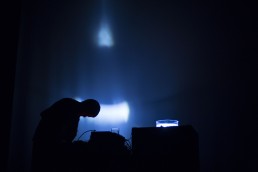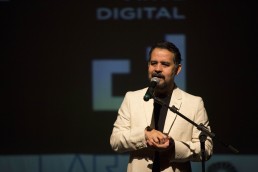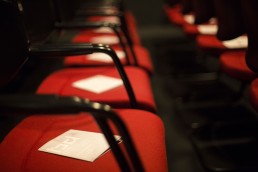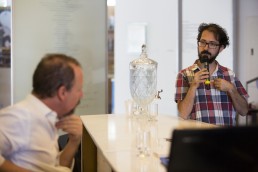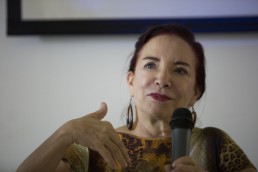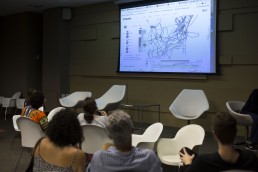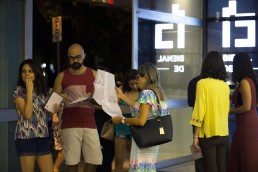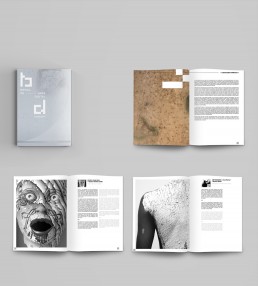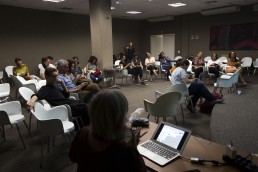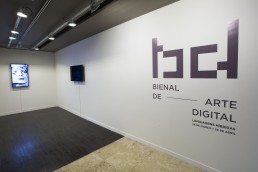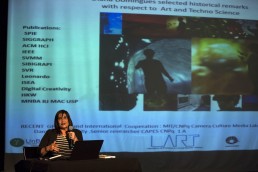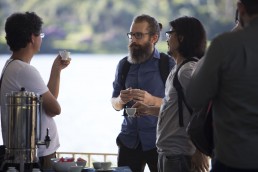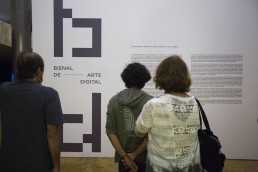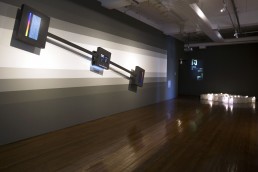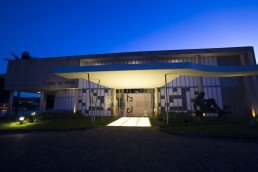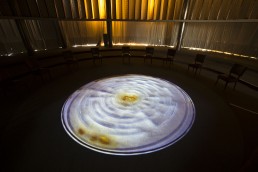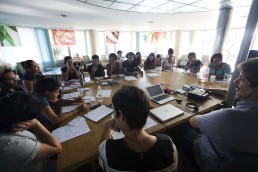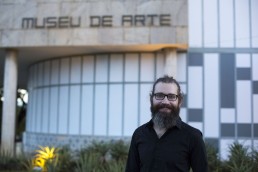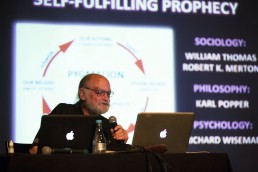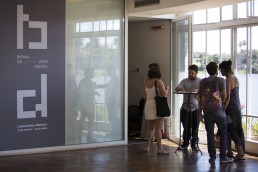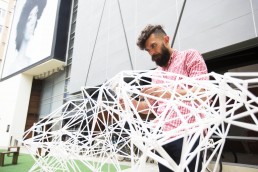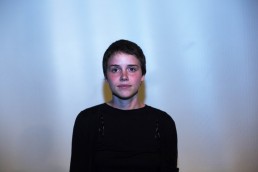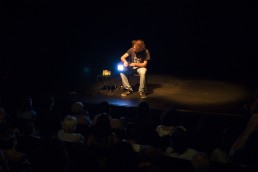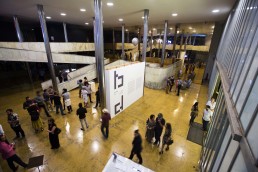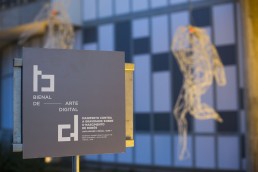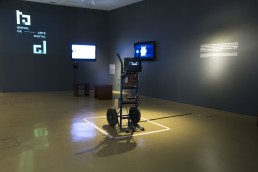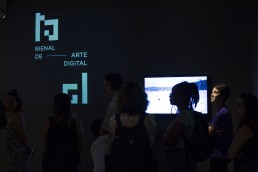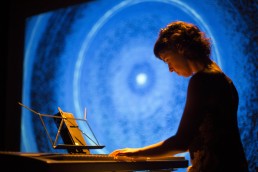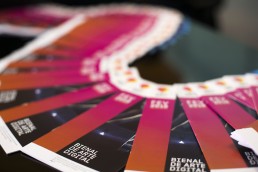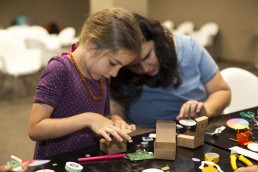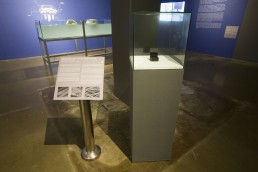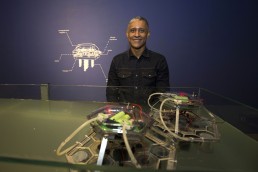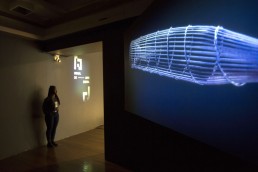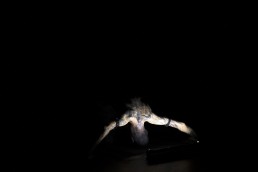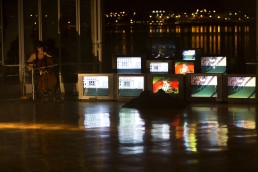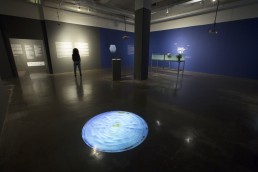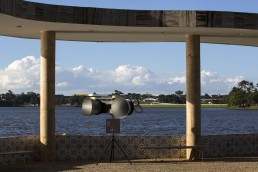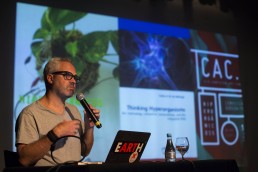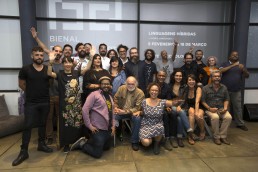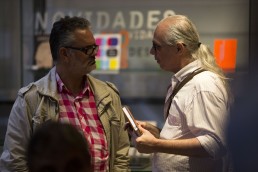A Bienal
No presente, o FAD – Festival de Arte Digital compreende que as dinâmicas de produção e fruição são emergentes, bem como a sua própria natureza ubíqua, múltipla, diversa. Mas talvez já não necessitamos processar as reflexões de forma tão ultraveloz, ainda que a compreensão sobre o nosso tempo, seja algo que urge. O nosso olhar deve acompanhar as dinâmicas atuais, bem como as produções técnicas devem avançar sem nenhum receio no tempo da indústria. Porém nos cabe uma missão um pouco mais árdua e complexa nesse universo fluido e telemático. Pensar a complexificação do presente, mais do que produzir um futuro ingênuo.
Desta necessidade, desde 2015 propomos como projeto o retorno de uma agenda bianual para as artes tecnológicas no Brasil. Surge então a partir da proposição de edições Bienais do FAD – Festival de Arte Digital, com a missão de valorizar sobretudo o pensamento crítico a cada dois anos dos processos digitais e tecnológicos da vida e na arte. Para o formato de uma bienal voltada às artes tecnológicas, a concepção de sua estrutura compete aos seus meios e circuitos. Foram mantidos os processos de seleção horizontalizados, próprios da arte tecnológica e seu circuito paralelo, como a manutenção do edital público de envio de trabalhos e a adesão de um conselho curador, amplo e irrestrito contando com acadêmicos, artistas, curadores, produtores culturais e técnicos do setor com possibilidades futuras de proposição de curadorias paralelas e independentes.
Com esta primeira Bienal idealizada pelo FAD em 2018, ela se torna um organismo próprio a partir de 2020, continuando o Festival de Arte Digital, focalizado nas ações emergentes e de proposições mais dinâmicas, acompanhando o desdobramento de nossas sociedade tecnológica e informacional (mostras, festivais, encontros, fóruns e exibições múltiplas em diferentes formatos).
[trecho do ensaio “Festival de Arte Digital – 10 anos” pertencente ao catálogo da Bienal. (Mucelli, 2018)]
Biennial
Currently, the FAD – Festival of Digital Art, understands that the dynamics of production and enjoyment are emerging, as well as its ubiquitous, multiple, and diverse nature. But perhaps we do no longer need to process the reflections so fast, even though the understanding of our time, is something urgent. Our gaze must accompany the current dynamics, as well as the production techniques should continue without fearless in times of industry and capital. However, we have a mission a little more arduous and complex in this telematics and fluid universe. Think of the Complexity of the present, rather than producing an artless future.
From this need, since 2015 we proposed as project the return of a half-yearly agenda for technological Arts in Brazil. It arises from the proposition of biennial editions of the FAD – Festival of Digital Art, with the mission of mainly valuing critical thinking every two years of digital and technological processes of life and art. For the format of a biennial focused on technology arts, the design of its structure to their means and circuits. Were maintained the processes of horizontalized selection, characteristic of technological art and its parallel circuit, as the maintenance of public notice of job submission and the accession of a board of trustees, broad and unrestricted counting with academics, artists, curators, cultural producers and technicians from the sector with future possibilities of proposition of parallel and independent trusteeships.
With this first Biennial conceived by the FAD in 2018, it becomes a fundamental body from 2020, continuing the Festival of Digital Art, focusing on more dynamical emerging actions and propositions, accompanying the unfolding of our technological and informational society (exhibitions, festivals, workshops, forums and multiple exhibitions in different formats).
[from the essay “Digital Art Festival – 10 years” belonging to the catalog of the Biennial. (Mucelli, 2018)]
Tema 2018
As configurações atuais da Arte Tecnológica têm se fundido com a vida contemporânea, num processo viral de trocas incessantes entre o mundo real e o simulado. Criam-se trabalhos híbridos, nos quais o digital e o analógico, o natural e o artificial, o real e o virtual, se atravessam. A tecnologia passou a ser vista como um fator constitutivo da vida humana e com a biotecnologia, a própria vida. As pesquisas científicas são reapropriadas e se transformam em linguagens artísticas, através do uso da interatividade, virtualidade, sistemas híbridos e imersão.
Para além da digitalização das informações, assistimos agora a um processo intenso de digitalização do mundo físico. Simultaneamente, em meio a esse fluxo veloz e exorbitante de informação em que vivemos, muitos artistas, criadores, profissionais, pesquisadores e intelectuais apontam para a necessidade de produzir outros ritmos, outras temporalidades, outras realidades, outros espaços e silêncios, para que seja possível transmutar e reconfigurar um novo lugar de utopia. Nesse sentido, o que se convencionou chamar de sociedade pós-digital parece marcar a transição de uma era caracterizada pelo encantamento tecnológico para uma outra, na qual encontrar novas maneiras de abordar, conceitualizar e repensar o universo artístico e social em relação a estas transformações é tarefa urgente.
A arte inserida no pós-digital propõe um movimento de escape do domínio tecnológico, mas sem descartá-lo completamente e faz um convite à experimentação no plano onde a existência física e a abstração do mundo digital se encontram. São trabalhos que exploram – através de meios alternativos à participação, interação e colaboração entre o público e o artista – sensações hápticas e sinestésicas dessa constante atualização da relação homem-máquina. Mais do que isso, eles expõem como as forças que constituem a condição de existência natural e tecnológica, agora mais orgânicas e simbióticas – ainda que não tenham perdido seu DNA na operação dos metadados e algoritmos – estão produzindo seres híbridos.
A computação vestível, a internet das coisas, a inteligência artificial, o BigData, a geolocalização, os processos da robótica, da automação, da computação quântica e do hibridismo pervasivo, tornam-se então matéria de expressão. Faz-se necessário que essas ferramentas sejam cada vez mais abertas, para que a inovação que trazem seja decodificada nas mais diversas manifestações, culturais e tecnológicas. Significa dizer que devem se constituir por meio de trocas e modificações disponíveis em seu entorno, permitindo-se o aprimoramento de conjuntos técnicos mais amplos. Não pode haver desenvolvimento tecnológico e inovação técnica sem uma certa margem de indeterminação, uma abertura das máquinas para novos acoplamentos.
Nesta edição especial do FAD, denominada Bienal de Arte Digital, o objetivo será exibir trabalhos e conceitos através dos quais as transformações, ao longo do tempo, dos processos digitais na vida, na criatividade e na sociedade através da arte e da comunicação, criam experiências por meio das hibridações imersivas aos visitantes.
Tadeus Mucelli e Ivan Ramos
Theme 2018
The current configurations of Technological Art have been fused with contemporary life in a viral process of incessant exchanges between the real and the simulated world. Hybrid works are created, in which the digital and the analog, the natural and the artificial, the real and the virtual, cross. Technology has come to be seen as a constitutive factor of human life and with biotechnology, as life itself. Scientific researches are re-appropriated and transformed into artistic languages through the use of interactivity, virtuality, hybrid systems and immersion.
In addition to the digitization of information, we are now witnessing an intense process of digitization of the physical world. Simultaneously, in the midst of this rapid and exorbitant flow of information in which we live, many artists, creators, professionals, researchers and intellectuals are calling attention to the necessity of producing other rhythms, other temporalities, other realities, other spaces and silences, so that transmuting and reconfiguring a new place of utopia are possible. In this sense, what has been conventionally called the post-digital society seems to mark the transition from an era characterized by technological enchantment to another, where finding new ways to approach, conceptualize and rethink the artistic and social universe in relation to those transformations is an urgent task.
The art inserted in the post-digital time proposes a movement of escaping from the technological domain, but without completely discarding it and invites the experimentation in a plane where physical existence and digital world abstraction meet. These works explore – through alternative means of participation, interaction and collaboration between the public and the artist – haptic and synesthetic sensations of such constant updating of the human-machine relationship. More than that, they expose how the forces that constitute the condition of natural and technological existence, now more organic and symbiotic – though they have not lost their DNA in the operation of metadata and algorithms – are producing hybrid beings.
Wearable computing, the internet of things, artificial intelligence, Big Data, geolocation, the processes of robotics, automation, quantum computing and pervasive hybridism, now become material of expression. It is necessary that these tools are increasingly open, so that the innovation they bring is decoded in the most diverse cultural and technological manifestations. It means that they must be constituted through changes and modifications available in their surroundings, allowing the improvement of larger technical groups. There can be no technological development and technical innovation without a certain margin of indetermination, an opening of the machines for new couplings.
In this special edition of FAD, called the Digital Art Biennial, the goal will be to show works and concepts through which the transformations, over time, of digital processes in life, in creativity and in society through art and communication, create experiences by means of immersive hybridizations for the visitors.
Tadeus Mucelli e Ivan Ramos
edital
O edital público internacional para seleção de trabalhos esteve disponível durante 30 dias no 2º semestre de 2017.
The international public call for artists entries was available for 30 days in the second half of 2017.
homologados
675 trabalhos de todo o mundo foram homologados em nosso sistema para avaliação.
675 works from around the world were registered in our system for evaluation procedures.
selecionados
Todos os trabalhos foram avaliados pelo nosso conselho curador, que chegou a avaliação final de 30 trabalhos.
All the papers were evaluated by our curator council, which arrived at the final selection of 30 proposals.
processo de avaliação
O processo de avaliação, durou 45 dias, com 20 encontros do conselho curatorial e mais de 400 horas dedicadas ao processo de seleção.
The evaluation process lasted 45 days, with 20 meetings of the curatorial council and more than 400 hours dedicated to the selection process.
Ficha Técnica
Concepção & Idealização:
FAD – Festival de Arte Digital
Projeto Executivo:
Conteúdo Arte & Tecnologia
Diretor Executivo:
Tadeus Mucelli
Direção Artística Geral:
Tadeus Mucelli e Ivan Ramos
Conselho Curador:
Marina Gazire, Gabriel Cevallos, Ivan Ramos, Pablo Gobira, Tadeus Mucelli, & Comissão Organizadora; Karla Danitza, Alexandre Milagres,Alexandre Dalbergaria, Bruna Finelli
Coordenação Técnica BH:
Francisco Cereno
Coordenação Técnica RJ:
Karla Danitza
Relações Internacionais:
Ivan Ramos
Educativo Bienal:
Alexandre Milagres
Produção BH:
Francisco Cereno
Produção Técnica BH:
Pavanello Projetos
Administrativo:
Luciene Eller
Assessoria Juridica:
Nuria Bertachini
Assessoria de Imprensa:
Agência Febre (RJ) e A Dupla Comunicação (MG)
Inteligência Digital:
Vai Formiga
Projeto e Identidade Visual:
Vitor Garcia
Criação Audiovisual:
Apiário
Fotos:
Erick Ricco
Site:
Julião Villas
Tradução e Versão:
Aline Rodrigues
Produção & Montagem RJ:
Electroship Produções – Gustavo Lawall, Domingos Donini, Rodolfo Almeida
Registro:
Estúdio Alicate
Captação de Recursos:
ICMS – MG
Diálogo Gestão – Lilian Oliveira
ISS – BH
Portal do Incentivo
Marca Alpha
